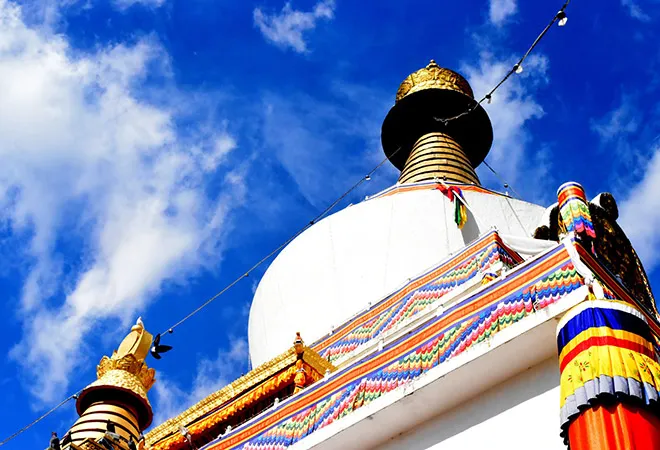-
CENTRES
Progammes & Centres
Location
Tourism is the worst hit sector in Bhutan. The livelihood of 50,000 citizens depends on this or allied sectors.

Even as the COVID-19 pandemic has hit the world as none other before it, the Himalayan kingdom of Bhutan has done well in keeping the number of infections at five. Two of them have recovered since. With no new case of virus-transmission reported as yet, the government has set its eyes on recovering from the possible economic onslaught of the virus.
The World Bank has brought down Bhutan’s GDP growth-rate projections to 2.2-2.9 percent from the pre-COVID-19 projection of 6.5. The small South Asian nation that values Gross National Happiness (GNH) as an indicator of measuring social and economic well-being of its citizens, has announced a slew of measures totalling Nu. 30 billion.
King Jigme Khesar Namgyal Wanchuck, in his address to the nation on 11 April, announced the creation of a National Resilience Fund (NRF) to provide relief and economic stability. The government has rolled out economic measures aimed at giving relief to the ‘hardest hit,’ in the words of the Prime Minister, Dr. Lotay Tshering.
An important initiative under the NRF is Druk Gyalpo Relief Kidu. The Kidu is aimed at supporting the citizens who have lost their livelihood owing to the adverse impact of the pandemic on businesses. The ambit of the Kidu, that usually carries a cash grant, has been expanded to include accommodation of students’ undergoing treatment in foreign country and conveyance costs of students stuck in a foreign land wishing to return back, but can’t afford.
Other major initiatives undertaken under the NRF include the interest payment relief, fast-track implementation of the 12th Five-Year Plan, and other fiscal and monetary interventions. Repayment has been deferred for all loans that were not in the non-performing loans list as of 29 February, by three months and waiver on interest payment for loans from April to June 2020.
In a bid to revitalise the rural economy, generate employment opportunities and focus on sectors like tourism, agriculture and infrastructure, investments have been frontloaded for implementation of 12th Plan activities. The government has reprioritised plan programmes and activities to create a fiscal space amounting to Nu. 3.7 billion to address immediate challenges.
The World Bank has flagged that agriculture, construction and export sectors are likely to be badly hit owing to labour shortages and lower external demand, and this trend is likely to continue till 2021. Hydropower, tourism and agriculture remain the largest contributors to the nation’s GDP. The World Bank indicated that domestic production of electricity might also decline. Delays in completion of hydropower projects will adversely affect Bhutan’s economy.
The disruption in the regular food imports caused by the COVID-19 pandemic has once again exposed the country’s vulnerability in food security requiring about Nu. 944 million or an equivalent of 31 percent of the 12th Plan budget allotted for the sector.
Tourism is the worst hit sector in Bhutan. The livelihood of 50,000 citizens depends on this or allied sectors. With the UN World Tourism Organisation predicting a plunge up to 30 percent in international arrivals and loss of $300-$450 billion, tourism sector would definitely feel the heat.
The continuing lockdown in ‘close friend and neighbour’ India is a major cause of worry for Bhutan. For now, the supply of essential goods through the international border continues. However, reliance on India for several imported goods could become vulnerable if the crisis becomes prolonged. Imports from India amount to 82 percent of Bhutan’s total imports. Foreign Direct Investment (FDI) to the country would be affected. More than 50 percent of FDI comes from India.
The nation looks up to the Indian friend to mitigate the economic impact of the pandemic. As a demonstration of the ‘special ties’ that the two countries enjoy, Prime Minister Narendra Modi called counterpart Tshering on 16 April, expressing concern and extending support for Bhutan as countries deal with COVID-19 situation.
Dr. Tshering expressed gratitude to Prime Minister Modi for the unconditional support India offered to Bhutan at all times, and more so now, when India too was dealing with crisis presented by the pandemic. On his Bhutanese counterpart’s request, Prime Minister Modi also agreed to the reprioritisation of activities and projects supported by India under the 12th Plan. India has committed an assistance of Nu. 4,500 crores and additional Nu. 400 crore for transitional trade support facility.
Besides, medical donations, India has ensured the supply of goods and essentials despite the lock-down in the neighbouring country and has assured Thimphu that it would continue to stand close in fighting the pandemic.
The views expressed above belong to the author(s). ORF research and analyses now available on Telegram! Click here to access our curated content — blogs, longforms and interviews.

Mihir Bhonsale was a Junior Fellow in the Strategic Studies Programme and Indian Neighbourhood Initiative of ORF.
Read More +